The air in Jemaa el-Fnaa square hangs heavy with spices and storytelling. As dusk falls over Marrakech, food stalls flicker to life, the sizzle of lamb skewers harmonizing with the whispers of henna artists. The muezzin’s call to prayer echoes across terracotta rooftops, painting the sky in amber hues. This sensory symphony marks my first evening of solo travel in Morocco – a journey that would transform not just my understanding of sustainable tourism, but my relationship with travel itself.
The sensory explosion of Jemaa el-Fnaa square at sunset – where my journey into eco-tourism in Morocco began
Cultural Immersion: Beyond Tourist Trails in Marrakech
My quest for authentic cultural experiences in Marrakech began with a simple choice – bypassing large hotel chains for a family-run riad in the ancient medina. This small decision set the tone for my entire approach to eco-tourism in Morocco. The riad, a traditional home with an inner courtyard, used locally sourced toiletries, employed neighborhood staff, and served breakfast featuring ingredients from nearby farms.
“Travelers often miss the real Marrakech,” explained Youssef, my riad host, as he poured mint tea in the traditional high-arcing stream. “To know our city, you must walk its streets slowly and speak with its people.” This philosophy became my guide as I navigated the labyrinthine souks, not just purchasing handcrafted goods but learning the stories behind them.
In a quiet corner of the carpet souk, I spent an afternoon with Hassan, a third-generation weaver who explained how traditional Berber patterns tell stories of mountains, rivers, and family histories. “Each knot connects us to our ancestors,” he said, fingers dancing across colorful wool. “When you take this home, you carry our stories with you.” This exchange transformed what could have been a simple transaction into a cultural bridge – the essence of responsible tourism.
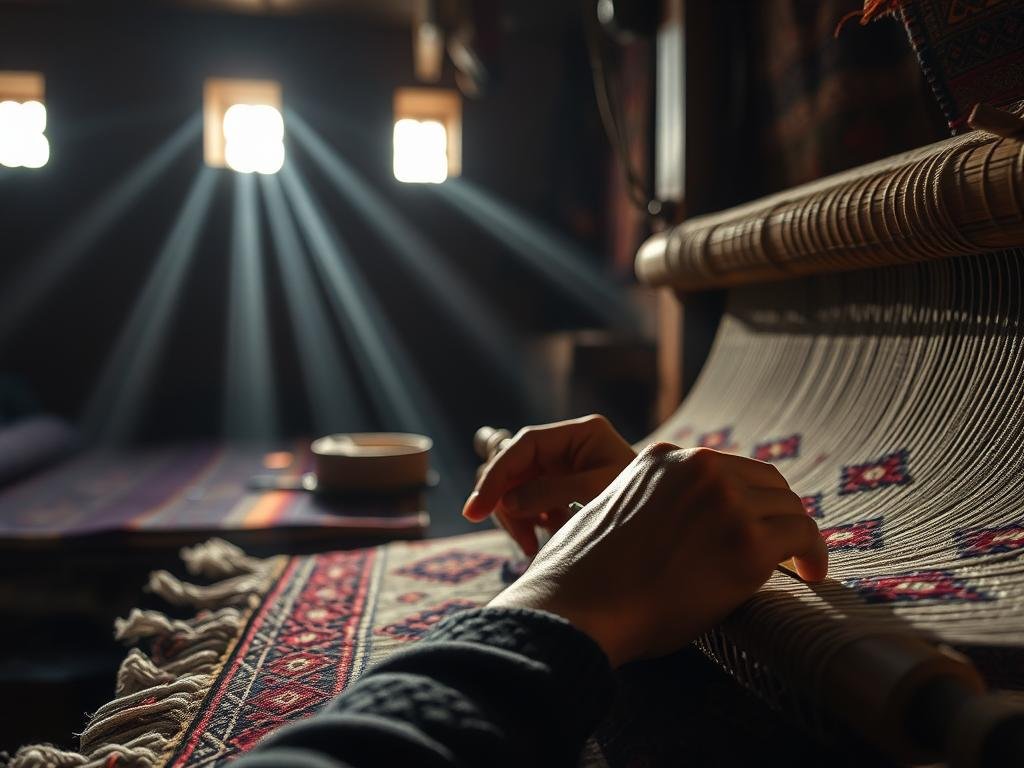
Hassan demonstrating traditional Berber weaving techniques passed down through generations
Finding Perspective: Hiking in the Atlas Mountains
Three days into my journey, the bustling energy of Marrakech gave way to the majestic silence of the High Atlas Mountains. I’d connected with a small eco-tourism cooperative that arranged guided hikes with local Berber guides – ensuring tourism dollars flowed directly into mountain communities while providing authentic cultural exchange.
My guide, Ibrahim, led me through terraced valleys where walnut trees and apple orchards clung to steep slopes. “These farming methods have sustained our villages for centuries,” he explained as we passed stone irrigation channels. “Now we balance tradition with new sustainable practices to protect our mountains.”
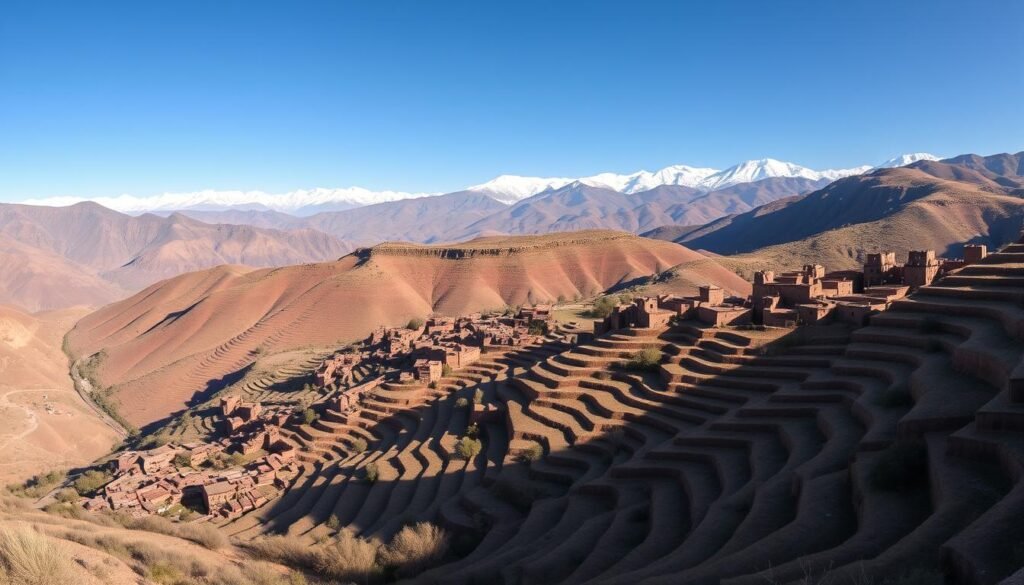
Terraced valleys and traditional Berber villages nestled in the High Atlas Mountains
As afternoon shadows lengthened, Ibrahim invited me to his family home – a simple mud-brick dwelling where three generations lived together. His mother taught me to prepare traditional bread, pressing dough against the hot walls of a clay oven. Later, we gathered around a low table for a meal of tagine slow-cooked with vegetables from their garden.
Over tea sweetened with local honey, Ibrahim’s father spoke of how climate change was affecting their traditional farming calendar. “The snow comes later now, and sometimes the spring rains fail,” he said. “This is why we welcome respectful travelers – to share our knowledge and create new ways for our village to thrive.”
Discover More Mountain Adventures
Explore sustainable trekking options and community-based tourism initiatives in Morocco’s most breathtaking landscapes.
Blue Havens and Green Practices: Eco-Lodges of Morocco
My journey continued to Chefchaouen, the famed “Blue City” nestled in the Rif Mountains. Beyond its Instagram-worthy azure streets lies a community deeply committed to sustainable tourism. I chose to stay at a small eco-lodge on the outskirts of town, a decision that revealed how Morocco is reimagining luxury through an environmental lens.
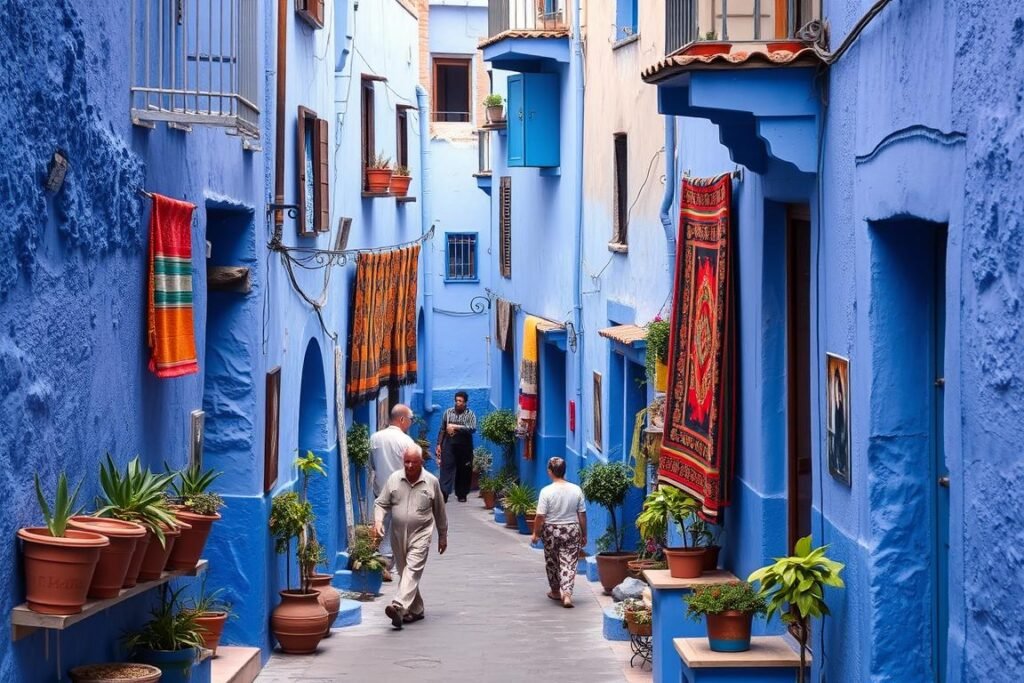
The mesmerizing blue streets of Chefchaouen, where traditional aesthetics meet eco-conscious living
The lodge, built using traditional techniques and local materials, operated entirely on solar power. Rainwater harvesting systems supplied showers and irrigated the organic garden that provided much of the kitchen’s produce. What impressed me most, however, was how these sustainable practices enhanced rather than diminished the experience of luxury.
“True luxury is harmony with your surroundings,” explained Fatima, the lodge manager. “Our guests come for the beautiful rooms and stay for the peace they feel knowing their presence supports rather than harms this place.”
During my stay, I participated in a workshop on natural dyeing techniques, learning how the region’s famous blue walls were traditionally colored using locally sourced indigo. The workshop was led by a women’s cooperative that had revived these ancient practices, creating economic opportunities while preserving cultural heritage.
Sustainable Features of Moroccan Eco-Lodges
- Solar power systems for electricity and hot water
- Rainwater harvesting and greywater recycling
- Locally sourced building materials and furnishings
- Organic gardens supplying on-site restaurants
- Waste reduction and composting programs
- Employment and training for local community members
Benefits for Travelers
- Authentic cultural immersion beyond tourist experiences
- Fresh, seasonal meals with regional specialties
- Meaningful connections with local communities
- Reduced environmental footprint while traveling
- Support for traditional crafts and cultural preservation
- Unique accommodations with character and history
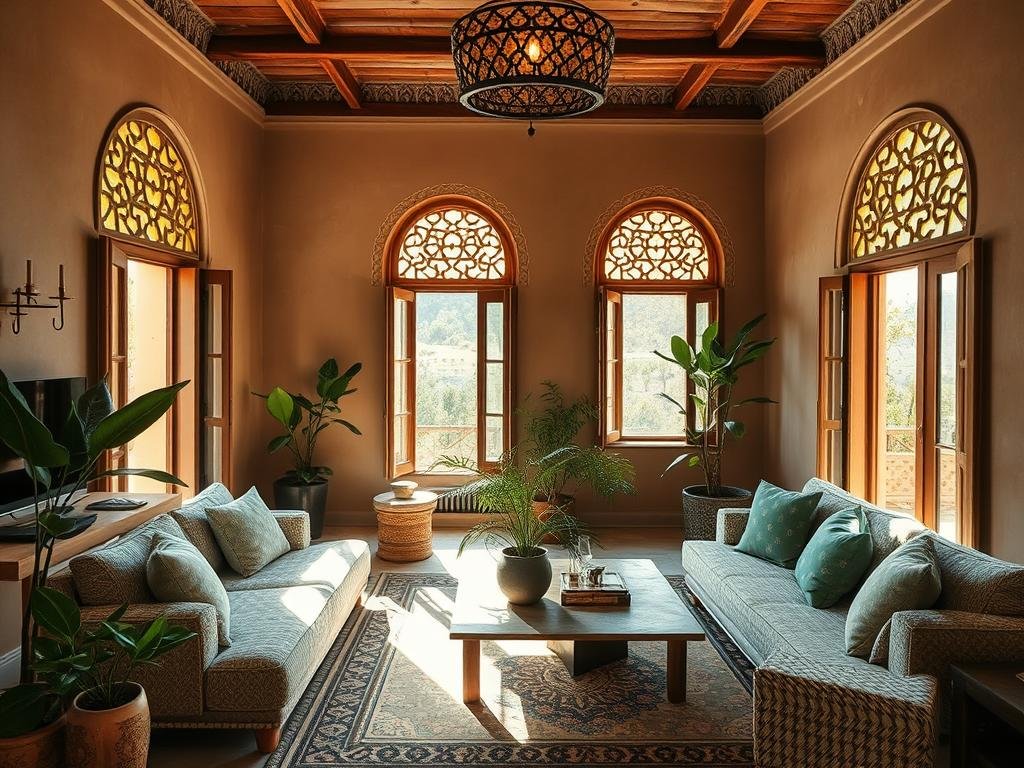
The harmonious blend of traditional Moroccan design and sustainable practices at my eco-lodge
Find Your Perfect Eco-Lodge
Discover Morocco’s most sustainable accommodations that combine luxury with environmental responsibility.
Desert Wisdom: Sustainable Adventures in the Sahara
No journey through Morocco would be complete without experiencing the Sahara Desert. Yet this fragile ecosystem faces increasing pressure from tourism. Determined to tread lightly, I researched camps with strong environmental policies before choosing a small operation run by a Tuareg family near Merzouga.
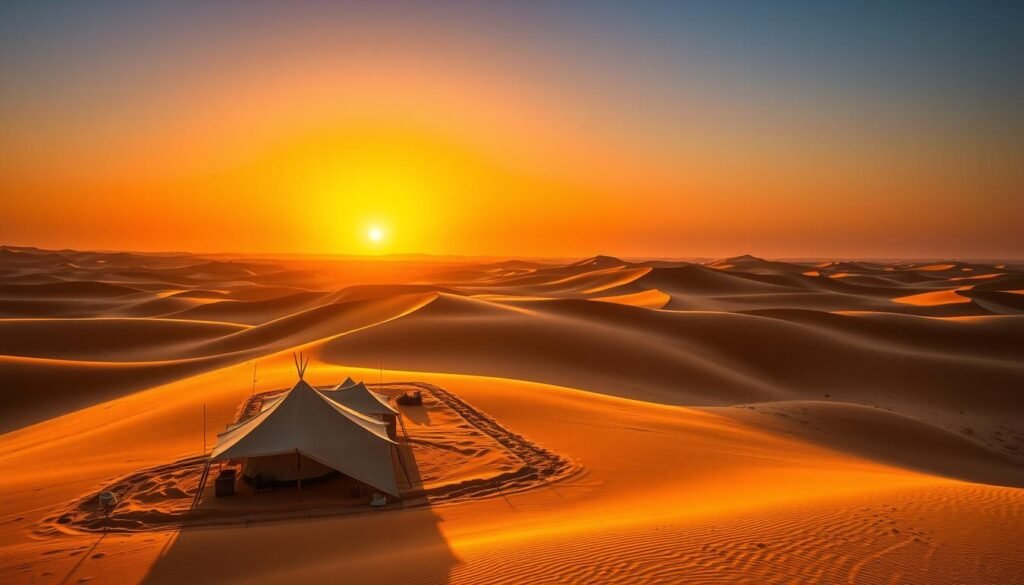
Dawn breaks over the Sahara Desert, illuminating our sustainable camp nestled among the dunes
Reaching the camp required a camel trek led by Omar, a young Tuareg guide whose family had traversed these sands for generations. As our small caravan moved deeper into the desert, Omar pointed out subtle signs of life – beetle tracks across dune faces, desert plants conserving precious moisture, the occasional darting lizard.
“The desert teaches us to use only what we need,” he said as we watched the sun sink below the horizon. “This is why our camp leaves no trace. We carry out all waste, use solar lamps, and limit our numbers to protect the dunes.”
That night, seated around a small fire beneath an explosion of stars, I shared mint tea with travelers from across the globe. Our conversation drifted from personal journeys to the challenges facing Morocco’s delicate ecosystems. A German biologist described conservation efforts to protect desert species, while a Moroccan university student spoke passionately about youth-led climate initiatives in Casablanca.
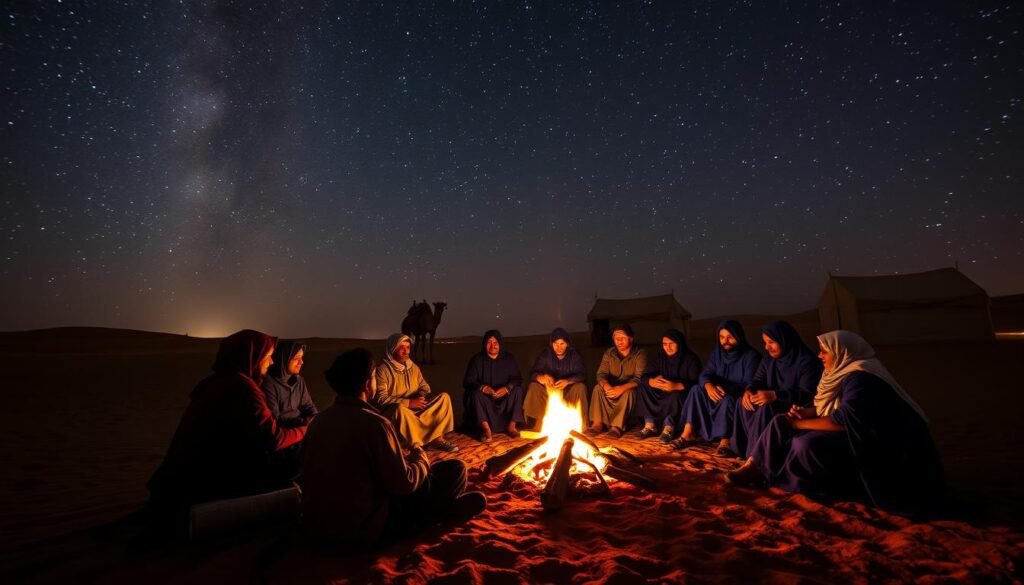
Cross-cultural connections form around the campfire under the vast Saharan night sky
Before dawn, Omar guided us to a high dune to witness sunrise. As the first golden light touched the rippled sand, creating a landscape of shadows and light, he shared a Tuareg proverb: “The desert knows that beneath its silence lies life waiting to bloom.”
This moment crystallized something essential about eco-tourism in Morocco – it’s not just about minimizing harm but about discovering the profound connections between landscapes, cultures, and our own inner journeys. The Sahara Desert adventure wasn’t just a highlight of my trip; it was a masterclass in how sustainable tourism can deepen rather than diminish our travel experiences.
Lost and Found: Transformative Moments
My most profound lesson in eco-tourism came unexpectedly in Fez, when I became thoroughly lost in the ancient medina – a labyrinth of over 9,000 narrow alleyways. My phone battery dead and my confidence waning, I felt a moment of genuine vulnerability that no guidebook had prepared me for.
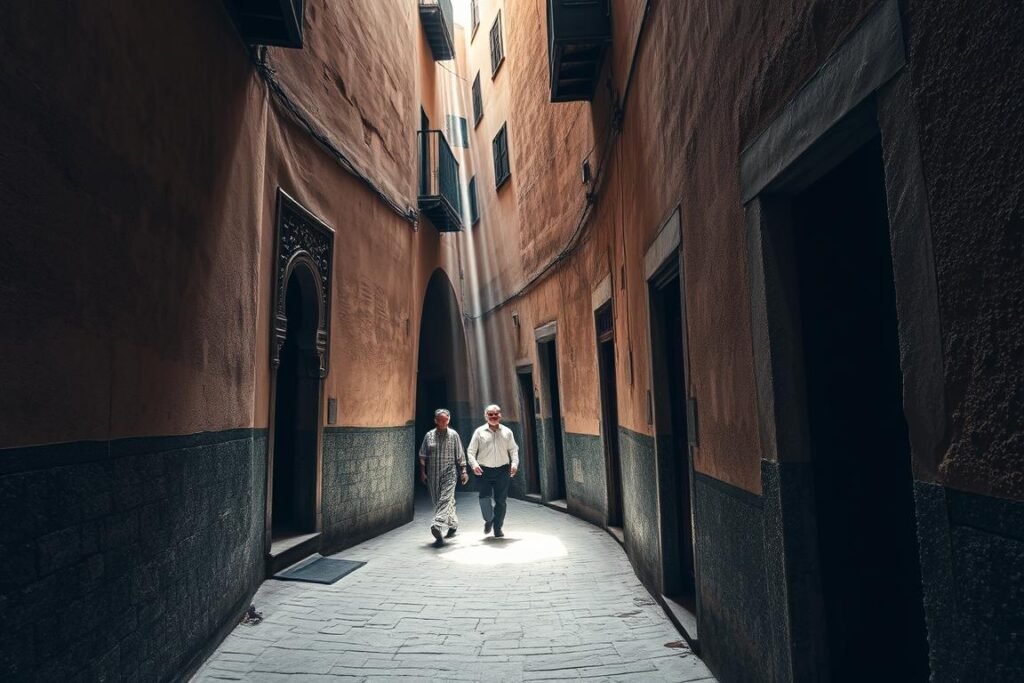
The labyrinthine alleyways of Fez’s medina, where getting lost became a gateway to authentic connection
After an hour of increasingly anxious wandering, I stopped at a small copper workshop where an elderly artisan named Karim was hammering intricate patterns into a tray. Noticing my distress, he set aside his tools and invited me to sit. “Being lost is not always a problem to solve,” he said, pouring tea. “Sometimes it is an invitation to discover.”
What followed was a three-hour conversation about craft, family, and the changing face of Morocco. Karim’s son arrived and insisted on walking me back to my riad, refusing payment but accepting my promise to share the story of their workshop with others.
This unexpected detour taught me that true eco-tourism in Morocco isn’t just about environmental choices – it’s about human connections that transform “solo” travel into something more nuanced. I was never truly alone; I was a temporary participant in a complex web of communities, traditions, and hospitality.
The most sustainable souvenir is the one that weighs nothing in your luggage but changes everything in your perspective.
Practical Wisdom: Sustainable Travel Tips for Morocco
My journey through Morocco revealed that sustainable choices often enhanced rather than limited my experiences. Here are the practical insights I gained for fellow travelers seeking to practice eco-tourism in Morocco:
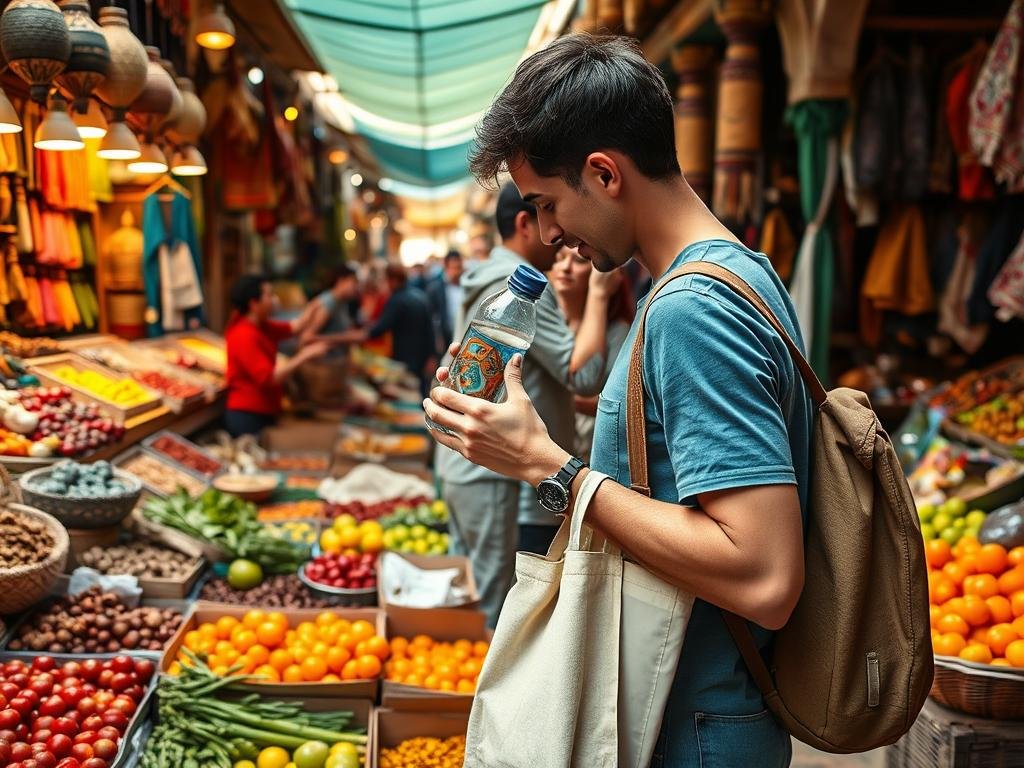
Simple sustainable choices like carrying a reusable water bottle and shopping at local markets make a significant difference
Water & Waste
- Bring a water filter bottle to reduce plastic waste while staying safe
- Carry a reusable shopping bag for market purchases
- Choose accommodations with water conservation practices
- Pack out all waste when visiting natural areas
Transportation & Tours
- Use public transportation or shared rides between cities
- Choose walking tours in medinas rather than vehicle tours
- Select desert camps with strict environmental policies
- Verify that tour operators employ local guides at fair wages
Cultural Respect
- Ask permission before photographing people
- Learn basic Arabic or Berber phrases
- Dress modestly, especially in rural areas
- Support women’s cooperatives and traditional artisans
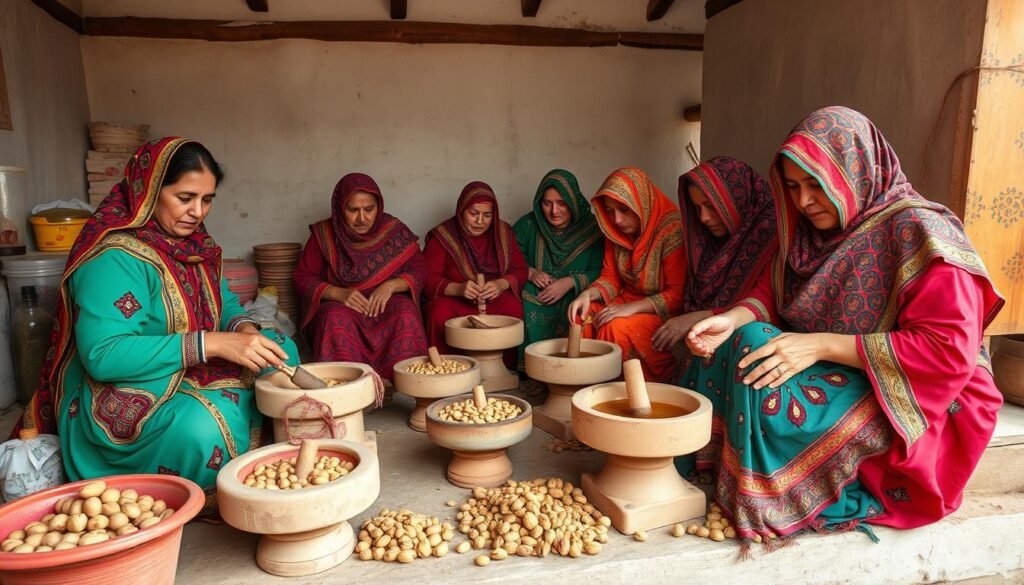
Supporting women’s cooperatives like this argan oil production facility creates sustainable economic opportunities
Become a More Sustainable Traveler
Discover comprehensive guides and practical advice for minimizing your environmental footprint while maximizing cultural connections.
The Journey Continues: Morocco’s Lasting Lessons
As my plane lifted away from Casablanca, I realized that eco-tourism in Morocco had fundamentally shifted my understanding of what it means to travel well. The most memorable experiences hadn’t come from checking off famous sites but from moments of genuine connection – with people, traditions, and landscapes that had evolved over millennia.
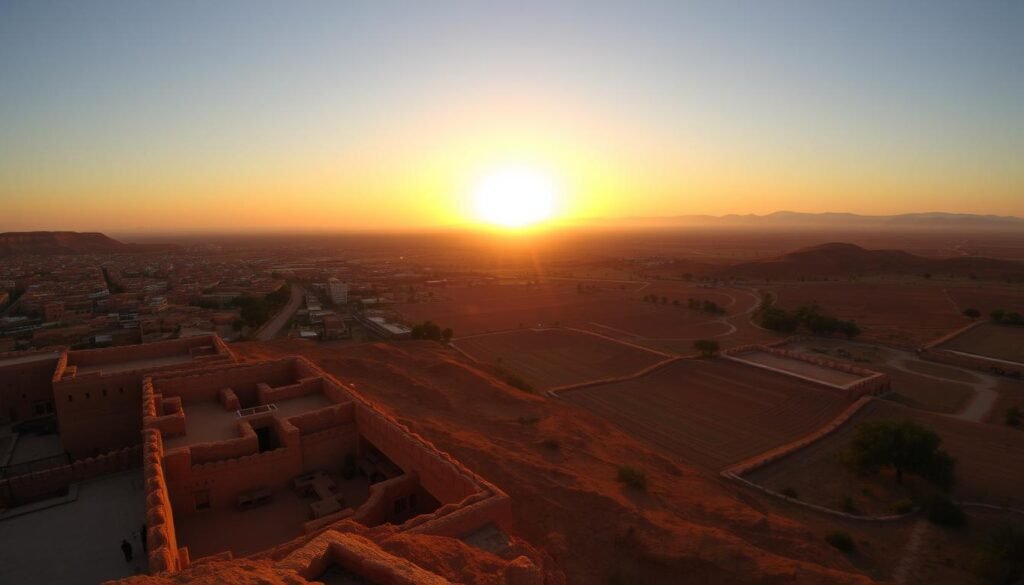
The diverse landscapes of Morocco offer lessons in resilience, adaptation, and sustainable coexistence
Morocco taught me that sustainable travel isn’t about perfection – it’s about intention and awareness. It’s choosing the local guide over the international tour company. It’s spending an extra day in one place rather than rushing to three. It’s valuing experiences that leave positive footprints in communities while minimizing our environmental impact.
Most importantly, I learned that eco-tourism in Morocco isn’t just better for the planet – it’s better for the traveler. By slowing down, connecting deeply, and treading lightly, we discover the authentic soul of a place that mass tourism often obscures.
The Sahara’s silence, the Atlas Mountains’ majesty, the medinas’ vibrant chaos – these weren’t just backdrops for my journey but teachers offering wisdom about balance, resilience, and interconnection. Lessons I carry forward, long after the desert sand has been shaken from my shoes.
Begin Your Own Sustainable Journey
Discover how eco-tourism in Morocco can transform not just your travel experience, but your perspective on the world.

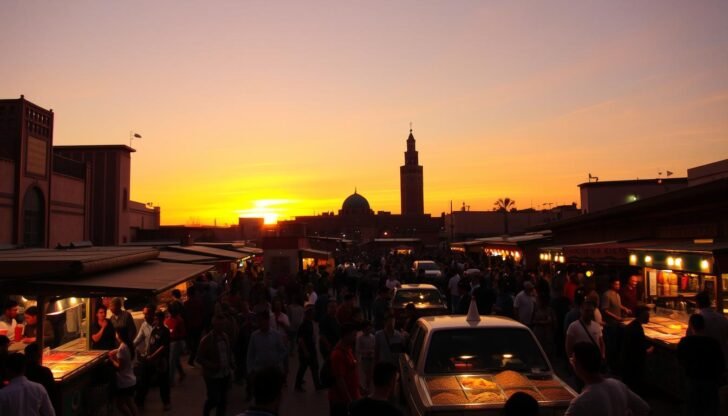
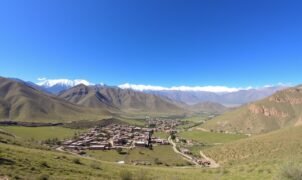











Leave a Reply